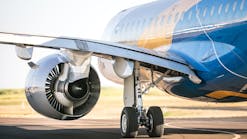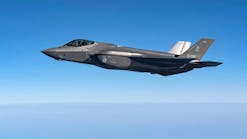BERKELEY, Missouri — Boeing is moving forward with its combat aircraft expansion project near its Berkeley complex, though recent comments from military officials have injected new uncertainty into an Air Force program the company is reportedly pursuing.
Steve Nordlund, senior site executive for Boeing St. Louis, said Wednesday the company is making a "tremendous amount" of investment in developing capabilities for fighter jets, satellites and "future products."
Nordlund referred to a new building included in the expansion here as an "advanced combat aircraft" site, expected to be completed in 2026. The new 1.1 million square-foot facility would nearly double its manufacturing footprint here.
Nordlund said Wednesday the expansion marks a "pretty big moment for the St. Louis site."
"Don't underestimate, this is a pretty big bet for the Boeing Company," he said.
The $1.8 billion expansion project at Boeing's north St. Louis County complex is poised to become one of the largest defense projects in the region's history. The county council approved about $155 million in tax breaks for the project in September.
Boeing also opened a specialized lab and testing facility here last year, and plans to open an advanced post-assembly site in the second quarter of 2025.
On Wednesday, as Nordlund showed reporters the view of the expansion sites from the seventh floor of the company's offices in Berkeley, he said he couldn't comment on what other programs the sites might include.
Boeing has said the expansion is intended for "new aerospace programs," suggesting that the project doesn't hinge on any one contract.
The expansion was announced last year as a competition moved forward to build the next generation of fighter jet for the Air Force, known as Next Generation Air Dominance, or NGAD. Last year the Air Force said it planned to award a contract in 2024.
Nordlund said he couldn't confirm or deny that the company is pursuing the competition, and the Air Force hasn't publicly said which defense contractors are competing. But trade publications have reported that Boeing is believed to be facing off against Lockheed Martin.
Earlier this month, Air Force Secretary Frank Kendall told Aviation Week that the 2026 fiscal year budget is "tough." Kendall didn't confirm that the service is looking at dramatically cutting funding for the competition, according to the report. Asked directly, he said: "I don't want to get ahead of myself on any of this, OK? I'm just saying we're open-minded right now on the things we're looking at."
A couple of days later, Air Force Chief of Staff Gen. David Allvin was asked at an Air & Space Forces Association event if, in light of other spending needs, the agency can still "do" NGAD.
"We're going to have to make those choices, make those decisions," Allvin responded.
Boeing had previously referred questions to the Air Force, citing the classified nature of the program. The Air Force said in a statement that it is building its budget memo for the 2026 fiscal year, and the details will be released early next year.
Loren Thompson, a longtime Washington-based defense analyst, said the Air Force seems to be signaling that the program is "something they'd like to have, but not something they're going to make huge sacrifices to achieve."
But given the secrecy of the program, even seasoned defense-industry analysts are finding it difficult to gauge the weight of Allvin and Kendall's remarks, or how Boeing officials may be feeling about them.
"NGAD is entirely secret," Thompson said. "It's hard to judge what the Air Force is saying. ... It's hard to determine what part it plays in Boeing's future business plan."
Briefings and tours with Boeing officials this week, in the leadup to the Farnborough International Airshow, proved that the expansion is one of many ongoing changes within the company's St. Louis footprint.
Officials have designed the layout for the T-7 trainer plane's manufacturing line in Berkeley, and expect the first parts to arrive later this year. The company has been building MQ-25 refueling drones at the same site, but later this year will move production over to a newly built, 300,000-square-foot factory at MidAmerica Airport in Mascoutah.
And with U.S. and foreign orders for fighter jets growing, the company hired about 100 people, recently, to staff up its F-15 manufacturing line. Boeing plans to deliver 16 this year, but will increase to 24 in 2026.
Earlier this year Boeing secured a $1.3 billion contract from the U.S. Navy for 17 new F/A-18s. Rather than winding down next year, the order extended the life of the St. Louis County manufacturing line into 2027.
©2024 STLtoday.com. Distributed by Tribune Content Agency, LLC.





